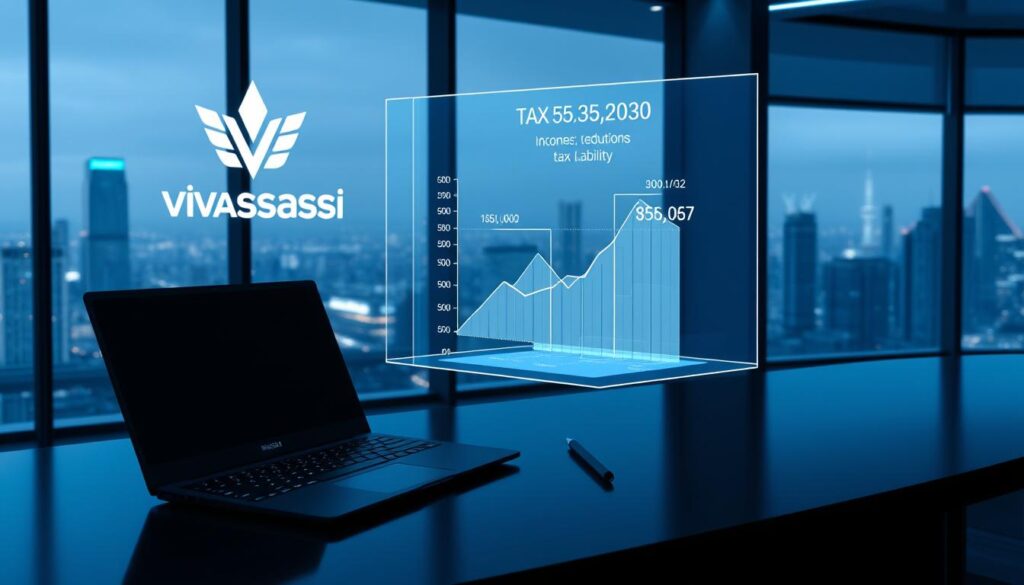The world of online gambling has witnessed a significant shift with the emergence of cryptocurrencies. Canadians are increasingly turning to crypto casinos for their gambling needs, drawn by the promise of fast transactions, enhanced security, and a wide range of gaming options.
As cryptocurrency becomes more mainstream, Canadians are finding new ways to enjoy it, including through crypto casinos. These platforms offer fast, secure, and fun gambling experiences, allowing players to use digital currencies like Bitcoin.
However, with this new form of gambling comes new tax implications. Understanding the tax on crypto gambling winnings in Canada is crucial for anyone participating in this growing trend.
Key Takeaways
- Canadians are increasingly using cryptocurrencies for online gambling.
- Crypto casinos offer fast transactions, enhanced security, and a wide range of gaming options.
- Tax implications on crypto gambling winnings are a crucial consideration.
- Understanding tax obligations is essential for Canadians participating in crypto gambling.
- Crypto gambling is becoming a significant trend in Canada.
Understanding Crypto Gambling in Canada
Crypto gambling is becoming increasingly popular in Canada, driven by the benefits of digital currencies. The use of cryptocurrencies for online betting offers enhanced security, faster transaction times, and lower fees compared to traditional payment methods.
What is Crypto Gambling?
Crypto gambling involves using digital currencies like Bitcoin, Ethereum, and Litecoin to place bets or gamble online. This form of gambling leverages the advantages of cryptocurrencies, including security and speed, to provide a seamless betting experience.
The anonymity and decentralised nature of cryptocurrencies make them an attractive option for online gamblers. Moreover, the use of digital currencies can enhance the overall gambling experience by reducing transaction times and fees.
Popular Cryptocurrencies Used in Gambling
Several cryptocurrencies are popular among Canadian gamblers, including:
- Bitcoin
- Ethereum
- Litecoin
These cryptocurrencies are favoured for their security features and the ability to facilitate fast, low-cost transactions. The use of such digital currencies is transforming the online gambling landscape in Canada.
Legal Status of Online Gambling in Canada
The legal status of online gambling in Canada is complex, with regulations varying across provinces. While some provinces have legalised and regulated online gambling, others have stricter controls.
Understanding the legal landscape is crucial for Canadians engaging in Canada online betting. It is essential to familiarise oneself with the specific laws and regulations in their province to ensure compliance.
Tax Implications of Gambling Winnings
Canadian gamblers must navigate the intricate tax rules surrounding their winnings. The tax implications of gambling winnings in Canada are multifaceted, involving both federal and provincial considerations.
Are Gambling Winnings Taxable?
Gambling winnings are considered taxable income in Canada. This includes winnings from cryptocurrency advantages such as those offered by online casinos using cryptocurrencies. The Canada Revenue Agency (CRA) requires gamblers to report their winnings as income.
The tax treatment can vary depending on the type of gambling and the jurisdiction. For instance, winnings from Canadian online casinos are subject to taxation, but the specifics can differ.
How Tax Laws Differ Across Provinces
Tax laws regarding gambling winnings are not uniform across Canada; they vary by province. Some provinces have specific regulations and tax rates that apply to gambling winnings. Understanding these online wagering benefits and their tax implications is crucial for compliance.
Gamblers must familiarise themselves with the tax laws in their respective provinces to ensure they are meeting their tax obligations correctly.
The Role of the Canada Revenue Agency (CRA)
The CRA plays a pivotal role in overseeing tax compliance, including the taxation of gambling winnings. The CRA requires accurate reporting of gambling income and provides guidelines for taxpayers to follow.
Gamblers should consult CRA resources and potentially seek professional advice to ensure they are in compliance with all tax regulations.
Reporting Your Crypto Gambling Winnings
Reporting crypto gambling winnings is a critical step in managing your tax obligations in Canada. As the popularity of online gambling continues to grow, it’s essential for Canadian gamblers to understand their tax responsibilities, especially when it comes to cryptocurrency transactions.
How to Report Your Winnings Accurately
To report your crypto gambling winnings accurately, you need to keep a detailed record of all your transactions. This includes both wins and losses. The Canada Revenue Agency (CRA) requires gamblers to report their income from gambling activities, and having comprehensive records will help you do this correctly.
Steps to Accurate Reporting:
- Record the date and amount of each transaction.
- Note the type of cryptocurrency used.
- Calculate the value of the cryptocurrency in Canadian dollars at the time of the transaction.
- Keep receipts or statements from the online gambling platform.
Records You Need to Keep
Maintaining thorough records is vital for tax compliance. The CRA may request documentation to support your reported income, so it’s crucial to have the following records readily available:
| Record Type | Description | Importance |
|---|---|---|
| Transaction History | Detailed list of all crypto transactions, including dates and amounts. | High |
| Receipts and Statements | Documents from online gambling platforms showing wins and losses. | High |
| Currency Conversion Rates | Records of the exchange rates used to convert crypto to CAD. | Medium |
Penalties for Non-Compliance
Failure to report your crypto gambling winnings accurately can result in significant penalties. The CRA takes non-compliance seriously, and the consequences can include fines and interest on the unreported income.
To avoid these penalties, it’s essential to understand your tax obligations and take steps to comply. This includes seeking professional advice if you’re unsure about how to report your winnings.
Calculating Your Tax Liability
Understanding how to calculate your tax liability is essential for Canadian gamblers using digital currencies. This process involves several key considerations to ensure compliance with Canadian tax laws.
Determining Net Winnings
The first step in calculating your tax liability is determining your net winnings from digital currency gambling. This involves totalling all your winnings and subtracting your losses. It’s crucial to keep accurate records of all transactions to support your calculations.
Net winnings = Total winnings – Total losses
For example, if you won 1.5 BTC and lost 0.5 BTC, your net winnings would be 1 BTC.
Deductions and Allowable Expenses
In calculating your tax liability, you may be able to deduct certain expenses related to your gambling activities. However, it’s essential to understand what expenses are allowable under Canadian tax law.
- Expenses directly related to gambling activities may be deductible.
- Records of all expenses should be kept to support your claims.
Crypto Price Fluctuations Impact on Tax
Cryptocurrency price fluctuations can significantly impact your tax liability. The value of your winnings is determined at the time of the transaction, and any subsequent fluctuations do not affect your initial tax liability.
For instance, if you won 1 BTC when its value was CAD 50,000, your taxable amount is CAD 50,000. If the value later drops to CAD 40,000, this does not change your tax liability.

| Transaction Type | Amount (BTC) | Value at Transaction (CAD) |
|---|---|---|
| Win | 1.5 | 75,000 |
| Loss | 0.5 | 25,000 |
| Net Winnings | 1 | 50,000 |
Cryptocurrency Taxation Basics
Understanding cryptocurrency taxation basics is crucial for Canadian gamblers to navigate their tax obligations effectively. Cryptocurrency transactions, including those related to online wagering, have specific tax implications that gamblers must be aware of to remain compliant with Canadian tax laws.
Capital Gains vs. Income Tax
Cryptocurrency is generally subject to capital gains tax, similar to other investment assets. However, under certain circumstances, it can be considered income. For instance, if cryptocurrency is received as payment for services or sold as part of a business operation, it may be treated as income rather than capital gains. Canadian gamblers must understand the distinction to accurately report their earnings.
The Canada Revenue Agency (CRA) provides guidelines to differentiate between capital gains and income. If a cryptocurrency is held for investment purposes and sold at a profit, the gain is typically considered a capital gain. Conversely, if the cryptocurrency is used to purchase goods or services, or if it’s part of a gambling business, the transaction may be subject to income tax.
Tax Rates for Crypto Transactions
The tax rates applicable to cryptocurrency transactions vary based on whether the gains are considered capital gains or income. For capital gains, only 50% of the gain is taxable, and the tax rate depends on the individual’s income tax bracket. For income, the entire amount is taxable at the individual’s marginal tax rate.
| Taxable Income | Tax Rate |
|---|---|
| Capital Gains (50% taxable) | Based on individual’s income tax bracket |
| Income | Individual’s marginal tax rate |
Treatment of Losses in Crypto Gambling
Losses incurred from cryptocurrency gambling can be used to offset gains, reducing the overall tax liability. However, the treatment of these losses depends on whether they are considered capital losses or business losses. Capital losses can only be used to offset capital gains, while business losses can be used to offset any type of income.
Canadian gamblers should maintain detailed records of their cryptocurrency transactions, including wins and losses, to accurately report their tax obligations. Utilising cryptocurrency advantages, such as transparent transaction records, can help in maintaining accurate accounts.
By understanding the basics of cryptocurrency taxation, Canadian gamblers can better navigate the complexities of tax compliance and potentially benefit from online wagering benefits, such as bonuses and promotions, while remaining within the legal framework.
Tax Strategies for Canadian Gamblers
Canadian gamblers can significantly reduce their tax liability by employing effective tax strategies. The world of cryptocurrency gambling offers numerous benefits, including the potential for significant winnings. However, navigating the tax implications can be complex.
Minimising Your Tax Burden
To minimise their tax burden, Canadian gamblers should consider several key strategies.
- Utilising tax-advantaged accounts can provide significant benefits.
- Keeping accurate records of all transactions is crucial for tax purposes.
- Understanding the tax implications of cryptocurrency transactions is vital.
Effective tax planning involves more than just reporting winnings; it requires a comprehensive approach to managing tax obligations.
Using Tax-Advantaged Accounts
Tax-advantaged accounts offer a valuable opportunity for Canadian gamblers to reduce their tax liability.
- Deferred tax on earnings
- Potential for tax-free withdrawals
- Flexibility in managing investments
By leveraging these accounts, gamblers can optimise their tax position and retain more of their winnings.
Importance of Professional Advice
Given the complexities of cryptocurrency taxation, seeking professional advice is highly recommended.
- Navigating tax laws and regulations
- Ensuring compliance with CRA requirements
- Optimising tax strategies for individual circumstances
Professional advice can help gamblers avoid costly mistakes and ensure they are taking advantage of all available tax savings opportunities.
Avoiding Common Mistakes
Understanding and avoiding common mistakes is crucial for Canadian gamblers to stay compliant with tax regulations. When it comes to reporting crypto gambling winnings, there are several pitfalls that individuals should be aware of to avoid potential issues with the Canada Revenue Agency (CRA).
Misunderstanding Tax Obligations
One of the most significant mistakes Canadian gamblers make is misunderstanding their tax obligations. The CRA requires individuals to report their gambling winnings as income, but many fail to accurately calculate their net winnings or misunderstand what constitutes a taxable event.
Key aspects to understand include:
- The definition of a taxable event in crypto gambling
- How to calculate net winnings
- The impact of crypto price fluctuations on tax liability
Errors in Reporting
Errors in reporting are another common issue. This can include failing to report all winnings, incorrectly calculating tax liability, or not maintaining adequate records. To avoid these errors, it’s essential to keep detailed records of all transactions, including dates, amounts, and the value of the cryptocurrency at the time of the transaction.
| Transaction Type | Record Requirements | Tax Implication |
|---|---|---|
| Gambling Winnings | Date, Amount, Crypto Value | Report as Income |
| Crypto Transactions | Date, Amount, Crypto Value | Capital Gains/Losses |
Ignoring Local Regulations
Ignoring local regulations is a critical mistake that can lead to severe penalties. Canadian gamblers must be aware of the legal status of online gambling in their province and comply with local regulations. This includes understanding any specific requirements for reporting gambling winnings and adhering to provincial laws regarding online gambling.
By being aware of these common mistakes and taking steps to avoid them, Canadian gamblers can ensure compliance with tax regulations and avoid potential issues with the CRA. It’s always advisable to consult with a tax professional to ensure accurate reporting and compliance.
Resources and Tools for Tax Preparation
Canadian gamblers engaging in online wagering can benefit from numerous tax preparation tools. These resources are designed to simplify the process of reporting digital currency gambling winnings and ensuring compliance with tax regulations.
Useful Software and Apps
Several software programs and mobile apps are available to assist with record-keeping and calculations for tax purposes. Popular options include TurboTax and H&R Block, which offer guidance on reporting gambling winnings and calculating tax liabilities. These tools can help gamblers maintain accurate records and ensure they are taking advantage of all eligible deductions.

Websites for Tax Guidance
Numerous websites provide valuable information on tax regulations and guidance for Canadian gamblers. The Canada Revenue Agency (CRA) website is a primary resource for understanding tax obligations related to gambling winnings. Other reputable sites, such as tax professional websites and financial advisory services, offer insights into tax strategies and compliance.
Contacting Tax Professionals
For personalised advice tailored to individual circumstances, Canadian gamblers can consult tax professionals. Certified Public Accountants (CPAs) and tax specialists can provide expert guidance on navigating complex tax situations, ensuring that gamblers are in compliance with all tax laws and regulations.
By leveraging these resources and tools, Canadian gamblers can simplify the process of tax preparation, ensuring accuracy and compliance with tax regulations related to digital currency gambling.
Conclusion: Staying Compliant and Informed
As Canadian gamblers navigate the world of crypto gambling, understanding the tax implications is crucial. The benefits of using crypto for online gambling in Canada2025, such as cryptocurrency advantages, make it an attractive option, but tax obligations must be met.
Tax Obligations and Compliance
Understanding tax obligations is paramount for Canadian gamblers involved in crypto gambling. The Canada Revenue Agency (CRA) requires accurate reporting of winnings, and failure to comply can result in penalties.
Future of Crypto Gambling Taxation
As tax legislation evolves, staying informed about future changes will be essential. Canadian gamblers must remain vigilant to ensure they remain compliant and optimise their tax position in the dynamic landscape of cryptocurrency gambling.
Staying Informed
To stay ahead, Canadian gamblers should continue to educate themselves on the latest tax laws and cryptocurrency trends. By doing so, they can ensure compliance and make the most of the cryptocurrency advantages.






